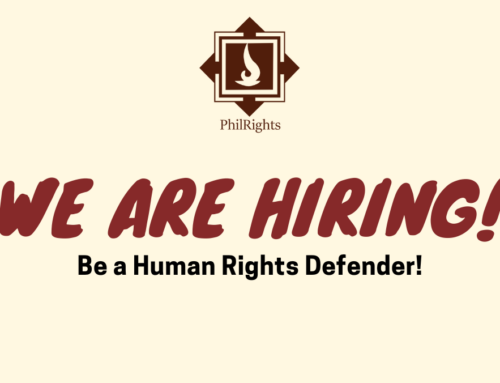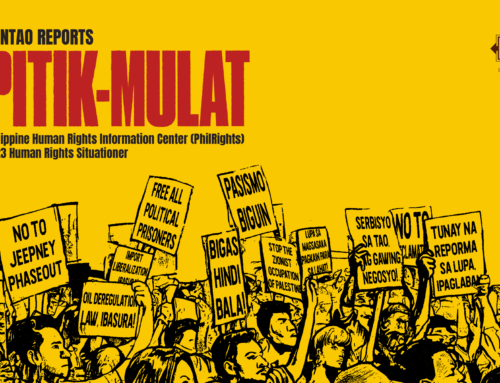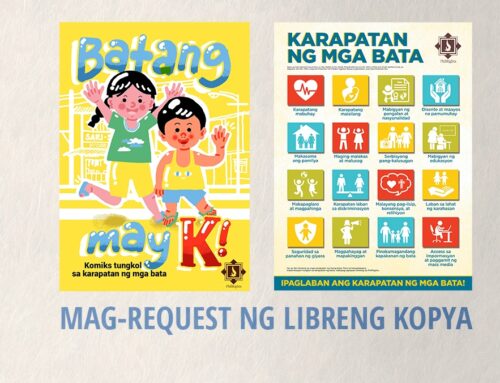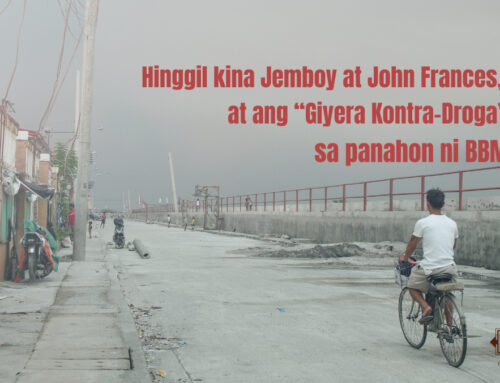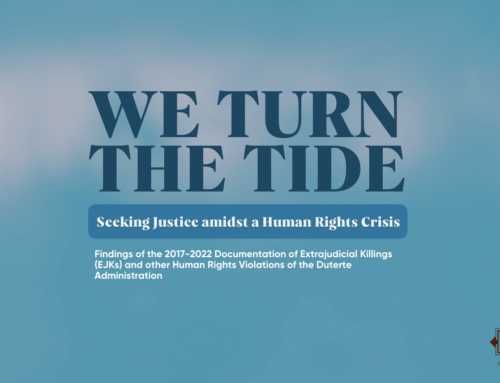by the Philippine Human Rights Information Center
Cora realized something important about talking about the past: it made it easier for her to bear the pain — even it meant remembering the day her eldest son and her grandson were gunned down in cold blood.
“When I tell the story of what happened, it feels like a load being lifted from my chest,” she said. “I’m able to express the pain I feel. Para pong gumagaan ang pakiramdam ko. Nailalabas ko po iyong sakit na nararamdaman ko.”
The tragedy happened one afternoon in October 2016, just five months into the presidency of Rodrigo Duterte.
Her son, Manuel, and his son, Miguel, went to the police station after Manuel was summoned by an officer he knew and who had asked him for help with a case. It was an odd request: the police man needed Manuel to supply the drugs for a buy bust operation.
Cora was there when he took the call. She became worried. She didn’t want him and her grandson to go. That unusual strange request from a local policeman — it turned out also to be a tragic one that devastated her family.
*****
Cora lived with her son and his family in Manila. Her husband, who worked as a barber, died about 20 years ago. Their son, Manuel, took it hard.
“He used to go everywhere with his father. They would go to the mall. He always wanted to be with his father. Ayaw niyang malayo sa kanya.”
When he died, Manuel was overcome with sadness. That’s when he started using drugs. “Bumarkada po siya. He began hanging out” with other young men who were into illegal drugs.
Manuel would be up all night, but he never became violent, she recalls. Eventually, he also started dealing, while working as a fare collector on jeepneys. He was close to Miguel, his son. They had planned to buy a motorcycle so Miguel could work as a tricycle driver. Manuel loved his son, even though Miguel disapproved of his father’s involvement in drugs. Her grandson knew of his grandmother’s growing concern for Manuel — especially Duterte was elected in 2016.
Talk about a violent crackdown spread in their community shortly after he came to power. “We all tried to warn him to stop. We asked him to leave our neighborhood. Mag ibang lugar ka muna. Go stay somewhere else for now.”
“Don’t worry, Ma. I’m going to die, they’ll get me wherever I go. Kung mamamatay ako, kahit saan ako pumunta, mamamatay ako.”
Cora at least got some reassurance from her grandson, Miguel who told her: “Don’t worry. I won’t follow Papa’s footsteps. Ayoko! I don’t want that life.”
*****
Looking back, Manuel’s confidence that nothing bad would happen to him may have been based on one fact: he apparently had an ally in the police, among those who were supposed to carry out the Duterte crackdown.
This became evident to Cora the morning of the killings. She and her family, including Manuel and Miguel, were having breakfast at around 9 a.m. when Manuel got a call on his cell phone. He put the call on speaker so Cora heard what they were saying.
“Come to city hall. Bring the shabu. We have an operation. Meron kaming operation,” the voice on the other line said.
It was Manuel’s contact with the police. “Pang-tanim daw sa target nila. They needed the drugs to plant it on a target.”
“Yes, sir,” Manuel said, adding that he would leave as soon as he finished having breakfast.
Cora felt uneasy about the call. Why would the police ask his son to bring drugs to the station? “Huwag kang magdala. Don’t bring any drugs,” she told him, warning him that it could be a set up. But Manuel said that she shouldn’t worry, that the policeman who called can be trusted and is a good person.
They had just finished eating when the policeman called again.”What’s taking you so long?” Manuel said he was leaving soon. He asked Miguel to borrow his friend’s motorcycle. They drove to the station at around 11 a.m.
It was the last time Cora saw them alive.
*****
They had not returned home by around noon which made Cora worry. But when she called Miguel he told his grandmother that Manuel’s police contact had offered them a meal. “He is really a good person, Ma,” he told Cora. “We’ll head home after we eat.”
It was around three that afternoon when Cora got a text message from a friend who told her that the bodies of her son and grandson were at a school. “Nandoon ‘yung dalawang mag-ama, nakabulagta. Patay na. Father and son are there, lifeless. They’re dead.”
Cora and her other grandchild rushed to the place. “Hindi ko pa alam ang gagawin ko. I didn’t know what to do.” Members of the SOCO (scene of the crime operatives) were there and one of them told her: “Did you know your son is a drug dealer?” It was a confusing scene especially after the phone call she heard between Manuel and the police officer.
The SOCO officer pulled out satchels of shabu from Manuel’s pocket. “Inisip ko na siya pala ‘yung target. He was the target.” And her grandson became one too.
A witness later told what happened. Apparently, Manuel and Miguel had just left the police station in the motorcycle, when they were chased by the police. It’s unknown why. The chase led to the street near the school where they were gunned down. “The police were after them. When they caught up with them at the school, they opened fire,” the witness said.
*****
Their bodies were taken to a local funeral parlor which demanded money before they would release them. “They charged us 25 thousand for each. 50 thousand total,” Cora said. The funeral parlor also said there should be an autopsy done, that’s another 20 thousand each.
“Hindi po namin kaya. We have no money,” Cora said. The funeral parlor manager said that it shouldn’t be hard for them to raise the amount. “Marami naman kayong malalapitan. You can turn to many people to help,” she was told.
Besides, the funeral parlor manager also said, she should get some of the money from the killings. It was widely known then that the police and their cohort received cash for every kill in the anti-drug campaign.
A dealer who is also a user is worth 100 thousand pesos. A user is worth 50 thousand. “Nanay, may pera po kayo. You will get money,” the manager told her.
The funeral parlor manager also said they would have to sign a document saying she refused an autopsy.
Somehow, Cora managed to raise the money through neighbors and friends. She and her family were able to retrieve the bodies.
*****
“Our lives became very sad after what happened. Naging malungkot ang buhay namin,” Cora said.
Until now, she added, her other grandson could not accept that his father and brother were gone. “Nawalan na ng ganang mag-aral. He lost interest in going to school.”
He works in construction or as a driver. He helps the family survive. “But it was a big loss. Malaking nawala sa amin,” Cora says. “We simply can’t forget what happened. Hindi po namin makakalimutan ang nangyari.”
But an encounter with a friend helped realize that she does not have to forget — that remembering what happened could actually help her heal. The friend introduced her to PhilRights which wanted to document the killings.
Cora agreed and sat down with a human rights researcher to share her story. It turned out to be a liberating experience. “Nasisiwalat ko po ang sama ng loob ko. Malaki pong tulong. Nabawasan na naman po ‘yung dinadala ko sa dibdib ko na sakit. I’ve been able to express myself and release the pain. It has really helped.”
Cora also found a new purpose: she began helping PhilRights find other survivors of the killings and to help them tell their stories. “Magpa-docu,” they call it. To have stories, the deaths, the murders, the abuses, documented.
“When we hear of a family who lost someone in the drug war, we reach out and talk to them. We tell them, ‘Tell your story to let the pain out. Para mailabas ninyo ang sama ng loob ninyo.’”
It is not always easy. She talked to another mother whose son was shot dead right in front of their home. It reminded Cora of what happened to her own son and grandson.
“Naaalala ko po ‘yung mga apo ko na nawalan din po ng tatay nila. I remember how my grandchildren also lost their father.”
Naaawa po ako doon sa ano, hindi ko po makalimutan ‘yung bata. Sa t’wing makikita ko po siya, sinasabi niya po ‘yun na, “Ayan na, ayan na ‘yung mga pumatay sa Papa ko.”, ganun po.
But the storytelling has been an enriching experience, she said. What lifted her spirits even higher was the camaraderie offered by the human rights organization. “Pag nagsasama kami, nawawala po ang lungkot sa buhay ko. Sumisigla po ang pangangatawan ko. When we’re together, I feel the misery dissipate. I feel energized.”




